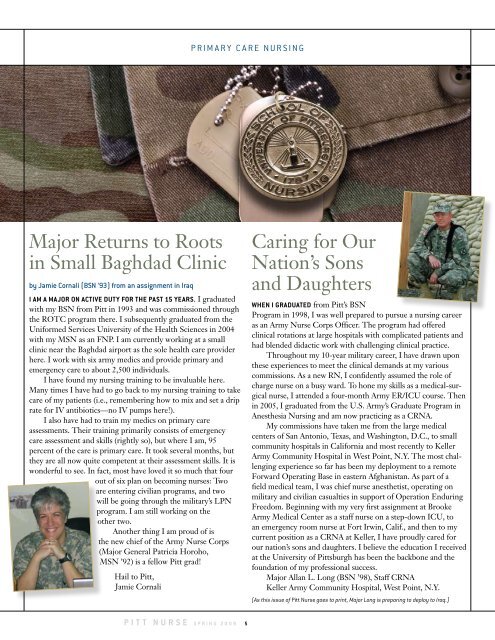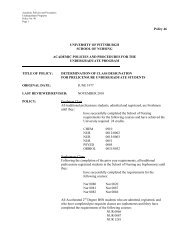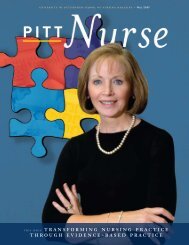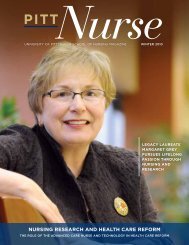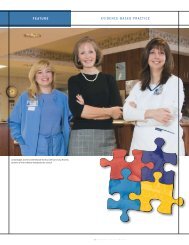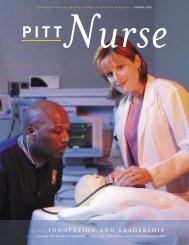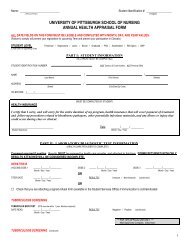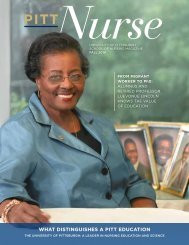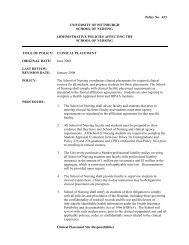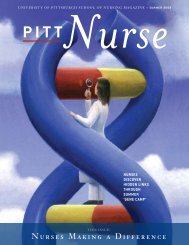primary care nurses, nursing care beyond the ... - School of Nursing
primary care nurses, nursing care beyond the ... - School of Nursing
primary care nurses, nursing care beyond the ... - School of Nursing
- No tags were found...
You also want an ePaper? Increase the reach of your titles
YUMPU automatically turns print PDFs into web optimized ePapers that Google loves.
Primary Care <strong>Nursing</strong>Major Returns to Rootsin Small Baghdad Clinicby Jamie Cornali (BSN ’93) from an assignment in IraqI am a major on active duty for <strong>the</strong> Past 15 years. I graduatedwith my BSN from Pitt in 1993 and was commissioned through<strong>the</strong> ROTC program <strong>the</strong>re. I subsequently graduated from <strong>the</strong>Uniformed Services University <strong>of</strong> <strong>the</strong> Health Sciences in 2004with my MSN as an FNP. I am currently working at a smallclinic near <strong>the</strong> Baghdad airport as <strong>the</strong> sole health <strong>care</strong> providerhere. I work with six army medics and provide <strong>primary</strong> andemergency <strong>care</strong> to about 2,500 individuals.I have found my <strong>nursing</strong> training to be invaluable here.Many times I have had to go back to my <strong>nursing</strong> training to take<strong>care</strong> <strong>of</strong> my patients (i.e., remembering how to mix and set a driprate for IV antibiotics—no IV pumps here!).I also have had to train my medics on <strong>primary</strong> <strong>care</strong>assessments. Their training primarily consists <strong>of</strong> emergency<strong>care</strong> assessment and skills (rightly so), but where I am, 95percent <strong>of</strong> <strong>the</strong> <strong>care</strong> is <strong>primary</strong> <strong>care</strong>. It took several months, but<strong>the</strong>y are all now quite competent at <strong>the</strong>ir assessment skills. It iswonderful to see. In fact, most have loved it so much that fourout <strong>of</strong> six plan on becoming <strong>nurses</strong>: Twoare entering civilian programs, and twowill be going through <strong>the</strong> military’s LPNprogram. I am still working on <strong>the</strong>o<strong>the</strong>r two.Ano<strong>the</strong>r thing I am proud <strong>of</strong> is<strong>the</strong> new chief <strong>of</strong> <strong>the</strong> Army Nurse Corps(Major General Patricia Horoho,MSN ’92) is a fellow Pitt grad!Hail to Pitt,Jamie CornaliCaring for OurNation’s Sonsand DaughtersWhen I graduated from Pitt’s BSNProgram in 1998, I was well prepared to pursue a <strong>nursing</strong> <strong>care</strong>eras an Army Nurse Corps Officer. The program had <strong>of</strong>feredclinical rotations at large hospitals with complicated patients andhad blended didactic work with challenging clinical practice.Throughout my 10-year military <strong>care</strong>er, I have drawn upon<strong>the</strong>se experiences to meet <strong>the</strong> clinical demands at my variouscommissions. As a new RN, I confidently assumed <strong>the</strong> role <strong>of</strong>charge nurse on a busy ward. To hone my skills as a medical-surgicalnurse, I attended a four-month Army ER/ICU course. Thenin 2005, I graduated from <strong>the</strong> U.S. Army’s Graduate Program inAnes<strong>the</strong>sia <strong>Nursing</strong> and am now practicing as a CRNA.My commissions have taken me from <strong>the</strong> large medicalcenters <strong>of</strong> San Antonio, Texas, and Washington, D.C., to smallcommunity hospitals in California and most recently to KellerArmy Community Hospital in West Point, N.Y. The most challengingexperience so far has been my deployment to a remoteForward Operating Base in eastern Afghanistan. As part <strong>of</strong> afield medical team, I was chief nurse anes<strong>the</strong>tist, operating onmilitary and civilian casualties in support <strong>of</strong> Operation EnduringFreedom. Beginning with my very first assignment at BrookeArmy Medical Center as a staff nurse on a step-down ICU, toan emergency room nurse at Fort Irwin, Calif., and <strong>the</strong>n to mycurrent position as a CRNA at Keller, I have proudly <strong>care</strong>d forour nation’s sons and daughters. I believe <strong>the</strong> education I receivedat <strong>the</strong> University <strong>of</strong> Pittsburgh has been <strong>the</strong> backbone and <strong>the</strong>foundation <strong>of</strong> my pr<strong>of</strong>essional success.Major Allan L. Long (BSN ’98), Staff CRNAKeller Army Community Hospital, West Point, N.Y.(As this issue <strong>of</strong> Pitt Nurse goes to print, Major Long is preparing to deploy to Iraq.)Pitt Nurse spring 2009 5


